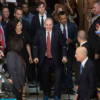To understand what’s going on in the Supreme Court today, we have to go back in time.
The year was 1965. Hundreds of people gathered in Selma, Alabama, to march for black Americans’ right to vote. Some states, especially in the South, had set up obstacles to voting, such as charging would-be voters money or making them take a test.
The Daily Signal depends on the support of readers like you. Donate now
The marchers were beaten back by police with billy clubs and tear gas in what would become a historic outrage. But just a few months later, President Lyndon B. Johnson signed the Voting Rights Act, making it illegal for towns to discriminate in any way in their voting practices.
Johnson said that day:
Millions of Americans are denied the right to vote because of their color. This law will ensure them the right to vote. The wrong is one which no American, in his heart, can justify. The right is one which no American, true to our principles, can deny.
Congress ensured that states could not get around the new law by coming up with more changes to local voting rules. For those areas that had historically discriminated against people, the law required that they check with the feds before making changes to their voting practices. This part of the law is called Section 5.
Section 5 was supposed to be temporary. It was supposed to transition the states into the new law and ensure that they were all implementing it correctly. As President Johnson said at the time, “if any county anywhere in this nation does not want federal intervention, it need only open its polling places to all of its people.”
The problem is, that federal intervention continues to this day. And that is what the Supreme Court is considering today—the outdated Section 5, not the whole Voting Rights Act.
The Voting Rights Act provides “broad and powerful protection against discrimination,” explains Heritage’s Hans von Spakovsky, a former Counsel to the Assistant Attorney General for Civil Rights. Regardless of the Supreme Court’s take on Section 5, the Voting Rights Act remains in effect to protect all Americans from voter discrimination.
But Section 5 outlived its purpose decades ago—and the federal government is still forcing some voting jurisdictions to justify all of their local rule changes. Von Spakovsky points out:
[Section 5] effectively presumes that all voting-related actions by certain states and jurisdictions are discriminatory and therefore requires that they obtain pre-approval from the federal government for otherwise ordinary and routine actions, such as moving a polling station from a school that is under renovation to another one down the street or drawing new redistricting plans. This is a major and unusual imposition on state sovereignty.
What was originally intended to safeguard individual liberty has become a way for the feds to attack state liberty. For the Department of Justice and many activists, Section 5 merely exists to bully local authorities.
Von Spakovsky says that if Section 5 were struck down, “The only change would be to curb the abuses of federal bureaucrats and check the power and influence of the liberal activist groups that rely on Section 5 to enforce their agendas.”
Today, the Supreme Court will hear arguments in Shelby County (AL) v. Holder, the case raising the question of Section 5’s constitutionality. The case doesn’t threaten anyone’s right to vote; it deals with an outdated provision that is no longer necessary—and in fact has become an unwarranted federal intrusion into local practices.
LEARN MORE:
Read the Morning Bell and more en español every day at Heritage Libertad.
Quick Hits:
- The Senate voted 58-41 to confirm Chuck Hagel as the new Secretary of Defense.
- A new government report reveals that Obamacare will add $6.2 trillion to the deficit.
- New Jersey’s Chris Christie became the latest governor to accept federal money to expand his state’s Medicaid program under Obamacare.
- Pope Benedict XVI gave his last general audience today. What happens next? Reuters explains.
- On Fox News last night, Heritage President-elect Jim DeMint said that President Obama’s tax hikes will do far more damage to the economy than sequestration.






























